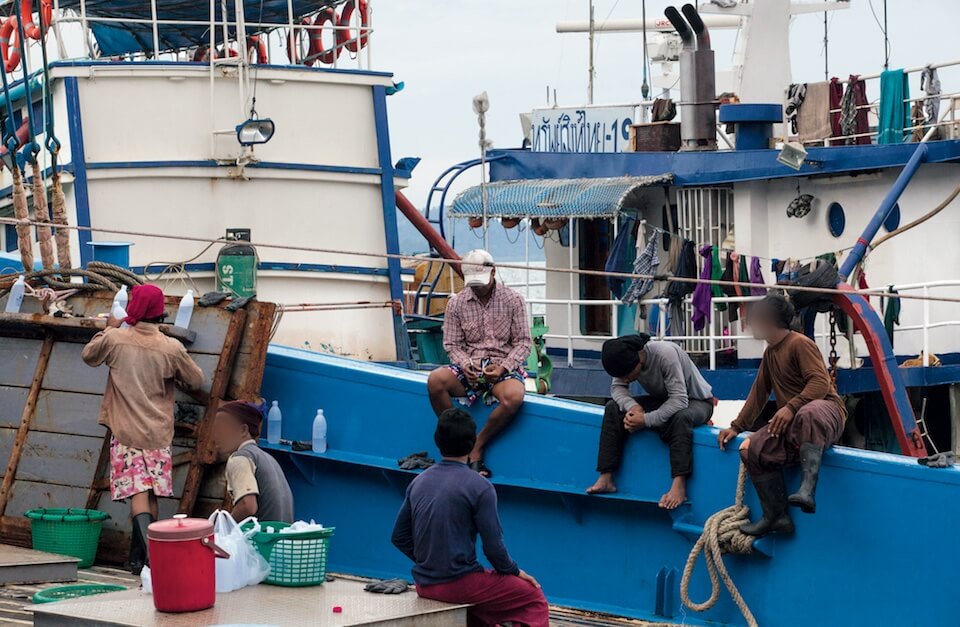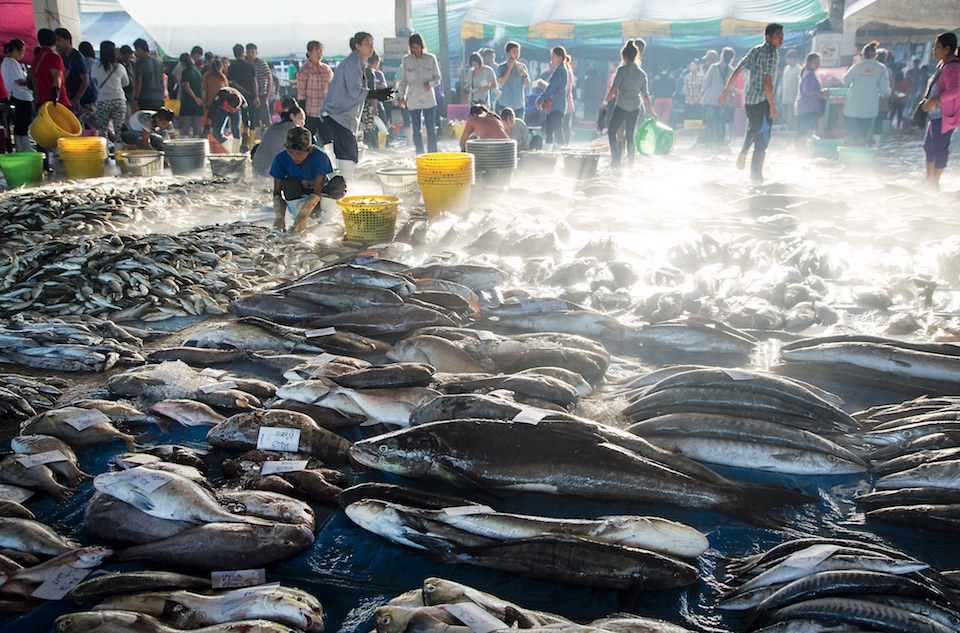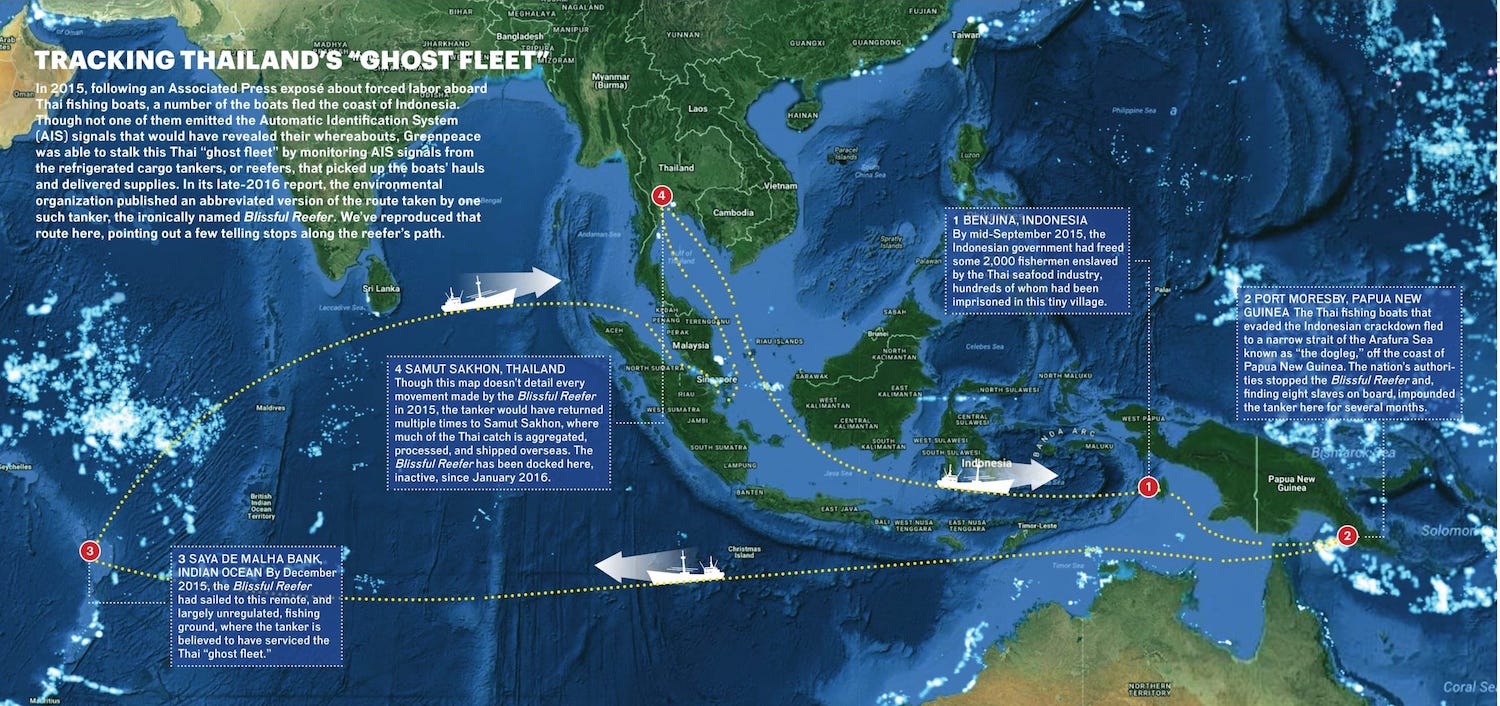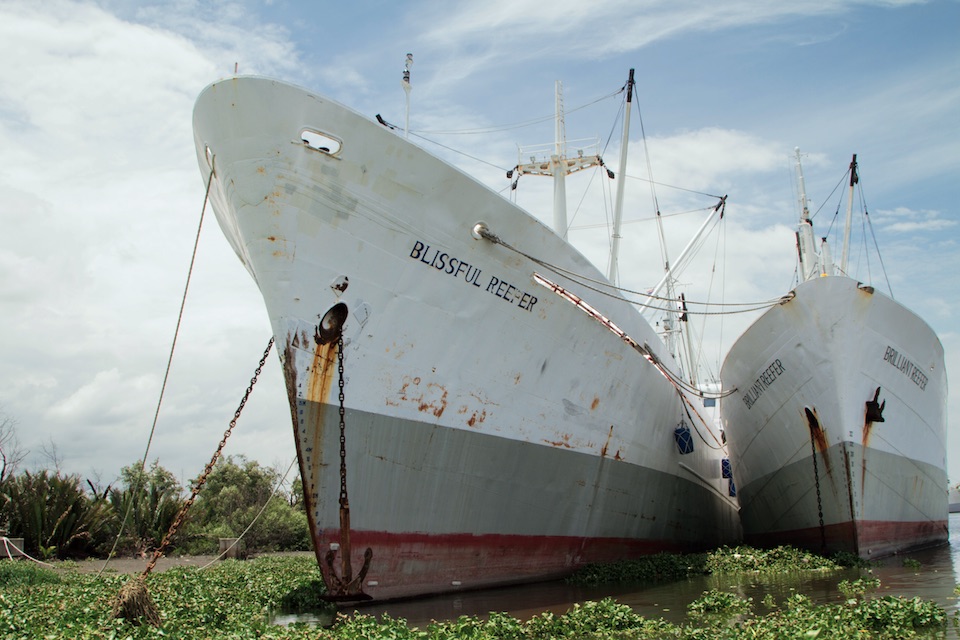Can Satellite Surveillance Help End Slavery in the Seafood Industry?
Even after reports surfaced of forced labor in the Southeast Asian fishing industry, ships crewed by enslaved migrants persist. Can satellite surveillance smoke them out?
Can Satellite Surveillance Help End Slavery in the Seafood Industry?
Even after reports surfaced of forced labor in the Southeast Asian fishing industry, ships crewed by enslaved migrants persist. Can satellite surveillance smoke them out?

Within six months of the AP’s initial report, the government of Indonesia, whose coast Thai vessels routinely trawled, had ordered the release of more than 2,000 enslaved fishermen and arrested at least nine culprits. The media frenzy soon died down. Unscrupulous practices in Southeast Asian waters did not.
Almost immediately, the Thai fishing boats that had evaded the Indonesian crackdown fled the area. Not one of them broadcast Automatic Identification System (AIS) signals, intended to prevent collisions, though some of the ships were large enough to be legally mandated to do so. Still, Greenpeace managed to track this “ghost fleet” to the remote Saya de Malha Bank near Madagascar by monitoring AIS signals from eight refrigerated cargo tankers that picked up the fleet’s hauls and dispatched supplies. (See “Tracking Thailand’s ‘Ghost Fleet,’” below, to trace one such cargo tanker’s route.)

The practice of offloading seafood and onboarding provisions, called “transshipment,” allows fishing boats to remain at sea longer, raising red flags for watchdog groups. John Hocevar, director of ocean campaigns at Greenpeace, sees a clear connection between transshipment and slavery. “Now that we’ve eaten most of the fish in the ocean, boats must go out farther and stay out longer to fill their holds,” Hocevar explains. “It’s become more difficult for fishing companies to turn a profit, so they stop paying fishermen a living wage and, in some cases, stop paying them at all.”
In December 2016, the environmental organization published an investigative summary revealing, among other crimes, further incidences of forced labor involving Thai ships. Five of the 30 Cambodian migrants on the Sor Somboon 19 died at sea; the 25 survivors suffered severe malnutrition. Together, the Kor Navamongkolchai 1 and Kor Navamongkolchai 8 held 15 additional Cambodians captive for over a year. “We were kicked, punched, and beaten with sticks,” one told a Greenpeace investigator.
By March 2017, the Thai government had issued mandatory recalls of its overseas fishing vessels, prosecuting and impounding 61 boats and insisting that the others employ satellite monitoring systems.

Satellite surveillance also informs the new Global Fishing Watch map, accessible at globalfishingwatch.org. (See “Keep Your Eye on the Water,” above.) The data and mapping platform – a joint project of Google, SkyTruth, and Oceana, funded primarily by the Leonardo DiCaprio Foundation – provides a near-real-time view of fishing activity around the world. Tony Long, the CEO of Global Fishing Watch and a former British Royal Navy commander, believes that the real power of the technology lies less in cops-and-robbers-style enforcement than in encouraging responsible behavior: “We’re effectively saying to boat captains: We’re making this information public, so if you aren’t complying with regulations, if you turn off AIS, you will stick out like a sore thumb, and that will bring pressure.”

Long envisions a day when supermarket shoppers will be able to scan the label on any package of tuna or shrimp with their phones and see a map that shows where, by whom, and under what conditions the fish was caught. Already, Boston-based importer and wholesaler East Bay Seafood plans to incorporate the Global Fishing Watch map into the daily inventory list it sends retailers – a small step in the growing effort to raise public awareness. As one enslaved Cambodian fisherman expressed to Greenpeace interviewers, “I want to tell consumers that the seafood you are eating comes from our suffering. . . . When you eat fish, please think about us.”
SaveSave
SaveSave
SaveSave
SaveSave
SaveSave
SaveSave
SaveSave
SaveSave
Follow us
This work is licensed under a Creative Commons Attribution-NoDerivatives 4.0 International License.
Want to republish a Modern Farmer story?
We are happy for Modern Farmer stories to be shared, and encourage you to republish our articles for your audience. When doing so, we ask that you follow these guidelines:
Please credit us and our writers
For the author byline, please use “Author Name, Modern Farmer.” At the top of our stories, if on the web, please include this text and link: “This story was originally published by Modern Farmer.”
Please make sure to include a link back to either our home page or the article URL.
At the bottom of the story, please include the following text:
“Modern Farmer is a nonprofit initiative dedicated to raising awareness and catalyzing action at the intersection of food, agriculture, and society. Read more at <link>Modern Farmer</link>.”
Use our widget
We’d like to be able to track our stories, so we ask that if you republish our content, you do so using our widget (located on the left hand side of the article). The HTML code has a built-in tracker that tells us the data and domain where the story was published, as well as view counts.
Check the image requirements
It’s your responsibility to confirm you're licensed to republish images in our articles. Some images, such as those from commercial providers, don't allow their images to be republished without permission or payment. Copyright terms are generally listed in the image caption and attribution. You are welcome to omit our images or substitute with your own. Charts and interactive graphics follow the same rules.
Don’t change too much. Or, ask us first.
Articles must be republished in their entirety. It’s okay to change references to time (“today” to “yesterday”) or location (“Iowa City, IA” to “here”). But please keep everything else the same.
If you feel strongly that a more material edit needs to be made, get in touch with us at [email protected]. We’re happy to discuss it with the original author, but we must have prior approval for changes before publication.
Special cases
Extracts. You may run the first few lines or paragraphs of the article and then say: “Read the full article at Modern Farmer” with a link back to the original article.
Quotes. You may quote authors provided you include a link back to the article URL.
Translations. These require writer approval. To inquire about translation of a Modern Farmer article, contact us at [email protected]
Signed consent / copyright release forms. These are not required, provided you are following these guidelines.
Print. Articles can be republished in print under these same rules, with the exception that you do not need to include the links.
Tag us
When sharing the story on social media, please tag us using the following: - Twitter (@ModFarm) - Facebook (@ModernFarmerMedia) - Instagram (@modfarm)
Use our content respectfully
Modern Farmer is a nonprofit and as such we share our content for free and in good faith in order to reach new audiences. Respectfully,
No selling ads against our stories. It’s okay to put our stories on pages with ads.
Don’t republish our material wholesale, or automatically; you need to select stories to be republished individually.
You have no rights to sell, license, syndicate, or otherwise represent yourself as the authorized owner of our material to any third parties. This means that you cannot actively publish or submit our work for syndication to third party platforms or apps like Apple News or Google News. We understand that publishers cannot fully control when certain third parties automatically summarize or crawl content from publishers’ own sites.
Keep in touch
We want to hear from you if you love Modern Farmer content, have a collaboration idea, or anything else to share. As a nonprofit outlet, we work in service of our community and are always open to comments, feedback, and ideas. Contact us at [email protected].by Brian Barth, Modern Farmer
January 12, 2018
Modern Farmer Weekly
Solutions Hub
Innovations, ideas and inspiration. Actionable solutions for a resilient food system.
ExploreExplore other topics
Share With Us
We want to hear from Modern Farmer readers who have thoughtful commentary, actionable solutions, or helpful ideas to share.
SubmitNecessary cookies are absolutely essential for the website to function properly. This category only includes cookies that ensures basic functionalities and security features of the website. These cookies do not store any personal information.
Any cookies that may not be particularly necessary for the website to function and are used specifically to collect user personal data via analytics, ads, other embedded contents are termed as non-necessary cookies.